An NBC 6 review of news reports, press conferences, public statements and recommendations from local, state and national leaders reveals some shared conflicting information and withheld important details about coronavrius cases.
It also shows the struggle to keep up with testing demands as the number of COVID-19 cases continue to grow in the state, leaving many South Florida residents frustrated and confused. This is a timeline of key events.
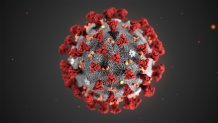
March 1
Gov. Ron DeSantis declares a public health emergency, amid two presumptive COVID-19 cases in Florida.
The governor's declaration comes four days after President Donald Trump said that COVID-19 posed a "very low" risk to Americans.
March 2
The Center for Disease Control and Prevention or CDC announces first confirmed cases of coronavirus in Florida: a man in his 60s in Manatee county, and a woman in her 20s in Hillsborough county. Gov. Ron DeSantis said around 800 people in total have been monitored in the state since late January. As of Monday, only 23 people had been tested for the virus in Florida, including the two positive cases.
March 4
The CDC expands guidelines for coronavirus testing allowing doctors to use their judgment to determine if “a patient has signs and symptoms compatible with COVID-19 and whether the patient should be tested.” The CDC initially recommended that doctors only test patients experiencing symptoms if they had a history of traveling to an affected country or if they had been in close contact with someone with a positive diagnosis. Florida continues limited testing criteria.
Local
March 6
Sen. Marco Rubio hosts a coronavirus roundtable in West Palm Beach. He acknowledges “the initial tests that were available were not as good as they needed to be,” adding more cases would be identified as testing becomes more widely available in the state. “These are cases that are already out there, we just don’t know about it.”
During a visit to the CDC’s headquarters in Atlanta, President Donald Trump falsely claims “...anybody that needs a test, gets a test.” The president’s remarks contradict information provided by state officials and a public statement from Vicepresident Mike Pence, made the day before, acknowledging a shortage of test kits.
The Florida Department of Health announces the first two deaths linked to the virus in Lee and Santa Rosa counties.
March 7
Broward County officials hold a news conference to provide an update on two presumptive positive coronavirus cases in the county. But as reporters press for more details about the cases, Dr. Paula Thaqi, from the county’s health department, declines to reveal how patients contracted the virus citing “ongoing epidemiological investigations.” When asked about testing, county officials don’t say how many kits are available or how long it will take to get results.
Later that day, Gov. Ron DeSantis said one of the Broward patients may have contracted the virus from a South Florida cruise line, during a press conference with national and local officials at Port Everglades, including Vice President Mike Pence. The Florida Department of Health didn’t disclose this information when it announced the cases.
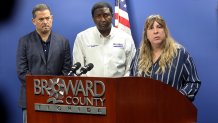
March 8
Florida health officials announce a new positive coronavirus case in Broward County: a 67-year-old man who is isolated. The announcement brings the total to three cases in the county, two related to the port.
Senat. Rick Scott sent a letter to several local and federal officials including health administrators in Lee and Santa Rosa counties demanding the release of additional information surrounding the two COVID-19 deaths previously reported in the state including the patients’ travel history. “The lack of publicly released information surrounding these cases is alarming and unfair to millions of families across the nation who are worried about their well-being,” he wrote.
March 9
Gov. Ron DeSantis signs a state of emergency declaration to help the state deal with growing concerns over coronavirus, as more COVID-19 cases have been confirmed. Hours after DeSantis signed the declaration, a fourth person was confirmed to have the coronavirus in Broward County.
Officials from the Broward County health department decline again to disclose information about cases and testing procedures during a roundtable with legislators. “How many test kits do we have? How many tests can we perform in Broward County right now,” U.S. Rep. Ted Deutch, D-Fla, asked the Director of the Broward County Health Department, Dr. Paula Thaqi.
“The tests are performed at the Florida Department of Health’s Bureau of Public Health Laboratories, so information about how many test kits are available needs to be directed to the Florida Department of Health,” Thaqi responded. “What I will tell you is that we have been able and continue to be able to test everybody who needs to be tested.”
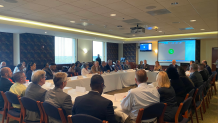
The Florida Department of Health issues a travel advisory recommending all individuals who have traveled internationally to self-isolate for 14 days following their date of return to the United States. NBC 6 contacted the department to seek clarification. About two hours later, FDOH updates the advisory saying self-isolation is only mandatory if the traveler has been in Level 3 countries including China, South Korea and Italy.
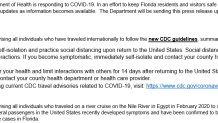
March 10
Broward County declares a state of emergency after a fourth case of coronavirus was confirmed in the county. County Administrator Bertha Henry announced the emergency declaration at Tuesday morning's Broward commission meeting, saying it will make way for more resources to fight the spread of COVID-19.
The move comes after state officials confirmed three employees of a company that greets cruise ship passengers at Port Everglades tested positive for the virus. The company, Metro Cruise Services, said the employees provided embarkation services at various cruise terminals in Port Everglades. The Florida Department of Health urges anyone who recently traveled through Port Everglades to isolate themselves for 14 days if they start experiencing symptoms.
March 11
NBC 6 reports that the governor's office and the White House are sending conflicting information on whether there is "community spread" within the state - leaving medical professionals without knowing where or how some are infected.
A day before, the nation's top expert on infectious diseases, Dr. Anthony Fauci said “There are parts of the country right now that are having community spread, in which the risk there is clearly a bit more than (elsewhere in the country) and you know the places: Washington State, California, New York and Florida," during a nationally televised news briefing.
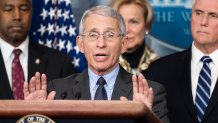
March 12
Gov. DeSantis announces he's issued an order to purchase 2,500 commercially available testing kits but acknowledges the state doesn't have the swabs required to collect the samples due to a nationwide shortage, leaving Florida with a blind spot when it comes to testing.
The Florida Department of Health shares testing criteria with NBC 6 and it's limited to:
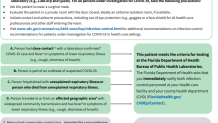
“You can’t just say everybody can get a test because, one, that’s not medically valid, and two, it would deplete resources,” DeSantis said while explaining testing limitations. “If you’re not symptomatic, you’re not going to test positive. I mean that’s just the reality.”
But Dr. Aileen Marty, from the Florida International University, tells NBC 6 Investigator Tony Pipitone, the governor is not necessarily correct, adding some people in China tested positive without symptoms, which they later developed.
March 13
State health officials tell NBC 6 that testing criteria has been expanded allowing people to be tested “at the discretion of their local health provider,” even if they don’t meet the testing criteria: 1) Being in close contact with a confirmed community spread 2) Being located in an area where there is confirmed community spread. 3) Experiencing unexplained respiratory illness that requires hospitalization 4) History of traveling to or from an affected geographic area with community transmission in the last 14 days and have a fever or symptoms of lower respiratory illness.
The move comes more than a week after the CDC expanded its testing guidelines.
Despite the FDOH’s statement, NBC 6 continues to receive reports from residents who have been unable to get a COVID-19 test even after a potential exposure or getting a prescription from a health provider.
"I'm really disappointed in the speed of the availability for testing," said a resident after learning she attended a large event where someone tested positive for COVID-19. "I did hear early today that in Miami, the mayor, who was contact or was exposed to someone who did test positive... he did get a test and unfortunately, he tested positive. But for me, who I was potentially exposed, there is no test."
March 14
State health officials announce the fourth Florida resident to die from the novel coronavirus Saturday evening. According to the Florida Department of Health, the person was a previously-announced case out of Lee county. The 77-year-old was not a travel-related case.
March 15
State officials report 155 Positive Cases of COVID-19 cases. Most of them involve Florida residents.
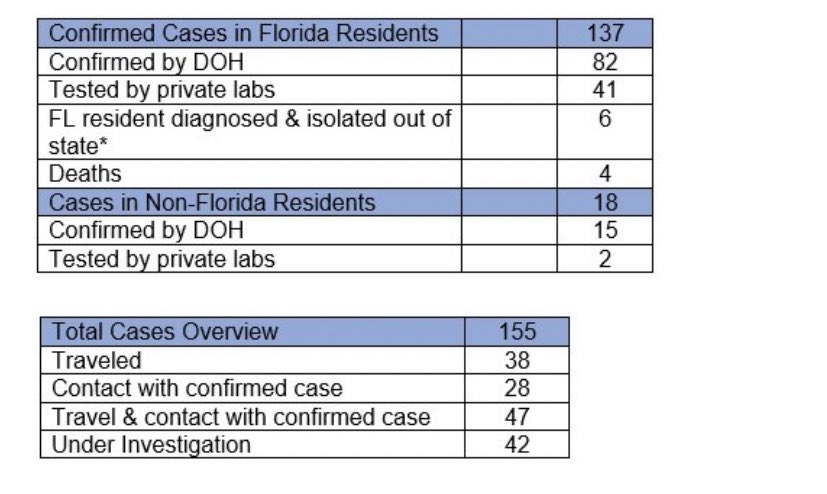
Gov. DeSantis announces a drive-thru testing facility will soon open at a hospital in Broward County, the hardest-hit county from the new coronavirus, as the state seeks to boost testing capacity. “We're going to work really hard to get this up and running as soon as possible,” DeSantis said at a news conference Sunday evening. “We want to put resources with the greatest need.”
March 16
The Florida Health Department announces more coronavirus cases bringing the state total to 160. Broward and Miami-Dade are now the top two counties in the state. Health officials said over 800 are awaiting testing.
Free drive-through coronavirus testing starts in West Palm Beach.
President Trump announces new guidelines recommending avoiding social gatherings in groups of more than 10 people.
March 17
Frustration over test kits' availability continues in the state. In an exclusive interview, a Broward resident tells NBC 6 she has been unable to get a test after getting a prescription from her primary doctor days ago.
Fort Lauderdale officials announced three elderly residents of two assisted living facilities have died, with one testing positive for COVID-19. The other two are suspected cases.
Richard Curren, a 77-year-old resident at Atria Willow Wood assisted living facility on W. Commercial Boulevard, is later identified as the first person to die from COVID-19 in Fort Lauderdale.
In a statement Tuesday, Atria said the resident who died had been in the hospital since March 6, and said there have been four other residents at the hospital being tested for COVID-19. One of those tests was negative, the center said.
"We have been in communication with the Broward County Department of Health and the CDC," Atria's statement read. "The Department of Health was on site earlier today to review the control measures we have in place and confirmed that we are taking the appropriate steps. We are working closely with them as well as the CDC to monitor the situation and take additional steps to mitigate any potential spread. Our experienced staff remains onsite and has implemented additional quarantine protocols."
March 18
More than 100 new coronavirus cases were confirmed in Florida, bringing the total to more than 300 along with another death related to the virus, state health officials said.
The state's new total rose to 328, including 299 Florida residents and 29 non-Florida residents, according to the Florida Department of Health. Broward still leads the state with 80 total cases, with Miami-Dade not far behind at 77. Some 1,140 results in the state were still pending.
The news comes as new drive-thru testing sites were opening in Miami-Dade. Broward was still awaiting a drive-thru testing site.
Fort Lauderdale officials say the three deaths of the elderly residents happened at Atria Willow Wood on W. Commercial Boulevard. They have initially said two facilities may be involved. Gov. Ron DeSantis announced later at a press conference that the two other residents who died at the facility tested negative for COVID-19.
During the same press conference, Mary Mayhew, from the Agency for Health Care Administration, revealed there are over 19 assisted living facilities where cases of COVID-19 were suspected or confirmed. But state officials do not say which facilities or the location of them citing patients' privacy.



